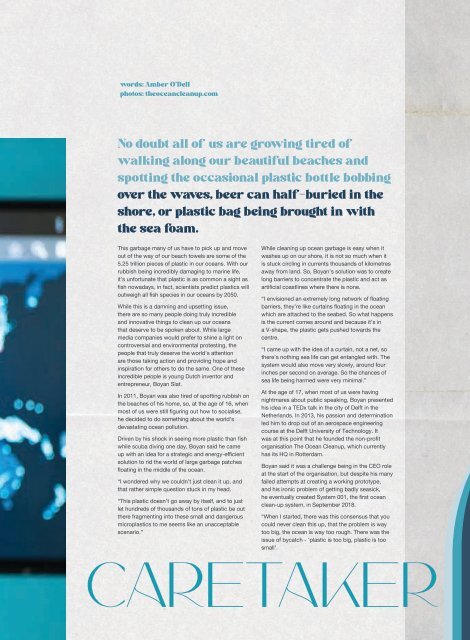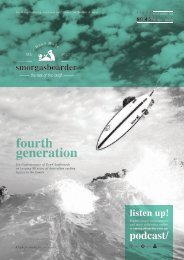SB_issue54_digital
Create successful ePaper yourself
Turn your PDF publications into a flip-book with our unique Google optimized e-Paper software.
words: Amber O’Dell<br />
photos: theoceancleanup.com<br />
No doubt all of us are growing tired of<br />
walking along our beautiful beaches and<br />
spotting the occasional plastic bottle bobbing<br />
over the waves, beer can half-buried in the<br />
shore, or plastic bag being brought in with<br />
the sea foam.<br />
This garbage many of us have to pick up and move<br />
out of the way of our beach towels are some of the<br />
5.25 trillion pieces of plastic in our oceans. With our<br />
rubbish being incredibly damaging to marine life,<br />
it’s unfortunate that plastic is as common a sight as<br />
fish nowadays, in fact, scientists predict plastics will<br />
outweigh all fish species in our oceans by 2050.<br />
While this is a damning and upsetting issue,<br />
there are so many people doing truly incredible<br />
and innovative things to clean up our oceans<br />
that deserve to be spoken about. While large<br />
media companies would prefer to shine a light on<br />
controversial and environmental protesting, the<br />
people that truly deserve the world’s attention<br />
are those taking action and providing hope and<br />
inspiration for others to do the same. One of these<br />
incredible people is young Dutch inventor and<br />
entrepreneur, Boyan Slat.<br />
In 2011, Boyan was also tired of spotting rubbish on<br />
the beaches of his home, so, at the age of 16, when<br />
most of us were still figuring out how to socialise,<br />
he decided to do something about the world’s<br />
devastating ocean pollution.<br />
Driven by his shock in seeing more plastic than fish<br />
while scuba diving one day, Boyan said he came<br />
up with an idea for a strategic and energy-efficient<br />
solution to rid the world of large garbage patches<br />
floating in the middle of the ocean.<br />
“I wondered why we couldn’t just clean it up, and<br />
that rather simple question stuck in my head.<br />
“This plastic doesn’t go away by itself, and to just<br />
let hundreds of thousands of tons of plastic be out<br />
there fragmenting into these small and dangerous<br />
microplastics to me seems like an unacceptable<br />
scenario.”<br />
While cleaning up ocean garbage is easy when it<br />
washes up on our shore, it is not so much when it<br />
is stuck circling in currents thousands of kilometres<br />
away from land. So, Boyan’s solution was to create<br />
long barriers to concentrate the plastic and act as<br />
artificial coastlines where there is none.<br />
“I envisioned an extremely long network of floating<br />
barriers, they’re like curtains floating in the ocean<br />
which are attached to the seabed. So what happens<br />
is the current comes around and because it’s in<br />
a V-shape, the plastic gets pushed towards the<br />
centre.<br />
“I came up with the idea of a curtain, not a net, so<br />
there’s nothing sea life can get entangled with. The<br />
system would also move very slowly, around four<br />
inches per second on average. So the chances of<br />
sea life being harmed were very minimal.”<br />
At the age of 17, when most of us were having<br />
nightmares about public speaking, Boyan presented<br />
his idea in a TEDx talk in the city of Delft in the<br />
Netherlands. In 2013, his passion and determination<br />
led him to drop out of an aerospace engineering<br />
course at the Delft University of Technology. It<br />
was at this point that he founded the non-profit<br />
organisation The Ocean Cleanup, which currently<br />
has its HQ in Rotterdam.<br />
Boyan said it was a challenge being in the CEO role<br />
at the start of the organisation, but despite his many<br />
failed attempts at creating a working prototype,<br />
and his ironic problem of getting badly seasick,<br />
he eventually created System 001, the first ocean<br />
clean-up system, in September 2018.<br />
“When I started, there was this consensus that you<br />
could never clean this up, that the problem is way<br />
too big, the ocean is way too rough. There was the<br />
issue of bycatch - ‘plastic is too big, plastic is too<br />
small’.<br />
CARETAKER
















